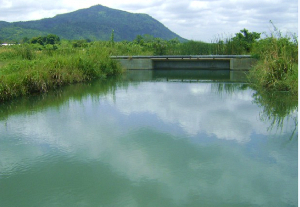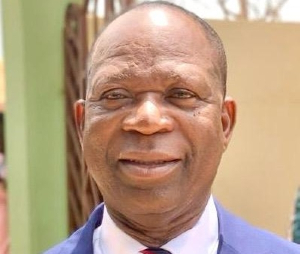A major initiative to rehabilitate and modernise the Kpong Irrigation Scheme (KIS) is being embarked upon.
The initiative, supported by the West Africa Food System Resilience Project (FSRP) and backed by a US$ 22.6 million investment from the World Bank, aims to significantly boost agricultural productivity in the Eastern and Greater Accra Regions.
Bryan Acheampong, Minister for Food and Agriculture, performed the sod-cutting ceremony at the Akuse-Eastern Region.
The rehabilitation project encompasses overhauling existing irrigation and drainage systems, installing advanced water management technology and enhancing local road networks to improve access for farmers.
The KIS rehabilitation’s initial phase was completed under the Ghana Commercial Agriculture Project (GCAP) and has previously benefitted about 2,000 smallholder rice farmers in addition to supporting the operations of Golden Exotic, a banana exporting company.
Hence, the expansive irrigation scheme is crucial not only for rice and banana cultivation but also aquaculture, particularly tilapia and catfish production.
The ongoing rehabilitation efforts are expected to strengthen climate change responses and enhance food security in Ghana.
Additionally, the programme encompasses constructing and enhancing vital facilities such as laboratories, seed banks, irrigation systems and markets for cross-border trade.
The FSRP is overseen by the Ministry of Food & Agriculture and focuses on implementing adaptive and sustainable strategies to assist vulnerable households and communities in managing food production uncertainties.
Key initiatives emphasise enhancing the production and marketing of staple crops, including rice, maize and soybeans.
FSRP also provides credit options for poultry farmers, supplies climate-smart seeds and fertilisers to crop farmers, promotes gender-sensitive technologies, monitors pest and disease issues, and establishes Automated Weather Stations for localised agricultural support.
Less than 2% of arable lands in Ghana are under any form of irrigation. Thus, over-dependence on the quantity and pattern of rainfall for crop production exposes the economy and livelihoods of citizens to fluctuations in production.
The initiative reaffirms the government’s commitment to sustainable agricultural practices and development. We hope the Pwalugu Dam can also be completed similarly to enhance food production in the north, considered a breadbasket region.
Watch the latest edition of BizHeadlines below:
Click here to follow the GhanaWeb Business WhatsApp channel













